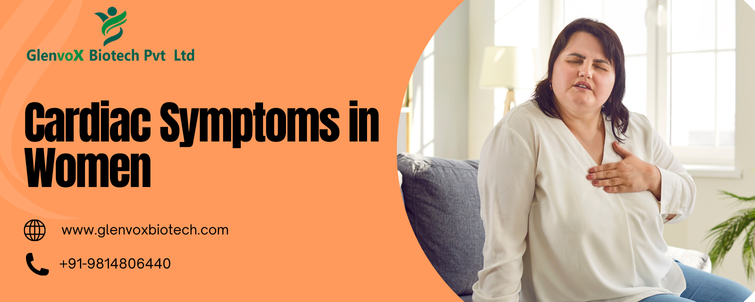



Heart disease is the leading cause of death among women worldwide, yet many are unaware that cardiac symptoms can present differently in women than in men. Understanding these differences is crucial for early detection and treatment. This guide will walk you through the unique Cardiac Symptoms in Women may experience, the risks involved, and how to take proactive steps for better heart health.
While chest pain is a common Cardiac Symptoms in Women, it may not always be severe or even the most prominent Cardiac Symptoms in Women. Women are more likely to describe chest discomfort as pressure, squeezing, fullness, or pain that can occur anywhere in the chest, not just on the left side.
Women are more likely than men to experience pain in the neck, jaw, upper back, or abdomen. This pain can come on suddenly, may wake you up in the middle of the night, and is often mistaken for other conditions like arthritis or muscle pain.
Shortness of breath, with or without chest discomfort, can be an early warning sign of a heart problem. It may occur suddenly or gradually and is often accompanied by other symptoms such as lightheadedness, fainting, or fatigue.
Gastrointestinal symptoms like nausea, vomiting, and indigestion are more common in women experiencing heart attacks. These symptoms can easily be mistaken for a stomach bug or food poisoning, delaying crucial medical attention.
Unusual or extreme fatigue is a common and often overlooked Cardiac Symptoms in Women. Women may feel tired even after resting and may struggle with activities that used to be easy. This fatigue can be persistent and is sometimes accompanied by feelings of anxiety or depression.
Breaking out in a cold sweat for no apparent reason can be a sign of heart trouble. Women experiencing a heart attack might feel sweaty and clammy even if they are not exerting themselves.
Hormonal fluctuations, especially those related to menopause, can increase the risk of heart disease in women. Decreased estrogen levels can affect the health of blood vessels and lead to higher cholesterol levels.
Conditions like preeclampsia, gestational diabetes, and high blood pressure during pregnancy can increase the risk of developing heart disease later in life. Women with these complications should monitor their heart health closely.
Autoimmune diseases such as lupus and rheumatoid arthritis are more common in women and can increase the risk of heart disease. These conditions cause chronic inflammation, which can damage the heart and blood vessels.
Depression, anxiety, and chronic stress are linked to higher risks of heart disease in women. These conditions can lead to unhealthy lifestyle choices, such as poor diet, lack of exercise, and smoking, which further increase heart disease risk.
Smoking, lack of physical activity, poor diet, and obesity are significant risk factors for heart disease. Women who smoke are at a higher risk than men who smoke, and obesity can affect women differently due to differences in body fat distribution.

Regular health check-ups are vital for monitoring heart health. Women should discuss their specific risk factors with their healthcare provider and get screened for blood pressure, cholesterol, and blood sugar levels.
A heart-healthy diet rich in fruits, vegetables, whole grains, lean proteins, and healthy fats can help reduce the risk of heart disease. Limiting salt, sugar, and saturated fats is also crucial.
Regular physical activity helps maintain a healthy weight, lowers blood pressure, and reduces cholesterol levels. Aim for at least 150 minutes of moderate-intensity exercise, such as brisk walking, or 75 minutes of vigorous activity, such as running, per week.
Smoking significantly increases the risk of heart disease. Women who smoke should seek help to quit, as doing so can improve heart health almost immediately.
Managing stress through techniques such as meditation, yoga, deep breathing exercises, and other relaxation methods can improve overall heart health. Mental health support is also crucial for those dealing with anxiety or depression.
For women with existing heart conditions or risk factors, taking prescribed medications as directed is vital. These medications can help control blood pressure, cholesterol, and other conditions that contribute to heart disease.
Cardiac symptoms in women can often be subtle and different from those experienced by men. Recognizing these unique signs and understanding the specific risk factors can lead to early detection and treatment, ultimately saving lives. By adopting a heart-healthy lifestyle and staying vigilant about their health, women can significantly reduce their risk of heart disease and lead healthier, longer lives.
Need personalized advice on Cardiac Symptoms in Women Reach out today and let our experts help you scale your operations and maximize your profitability.
Company Name – Glenvox Biotech
Company Address – Glenvox Biotech Pvt. Ltd Plot No.358, First Floor, Industrial Area Phase 2, Panchkula, Haryana 134113
Phone no. – +91-9814806440
website – https://glenvoxbiotech.com/
Q 1. What are common cardiac symptoms that women should be aware of?
Q 2. How do cardiac symptoms in women differ from those in men?
Q 3. What lifestyle factors contribute to cardiac symptoms in women?
Q 4. When should women seek medical attention for cardiac symptoms?